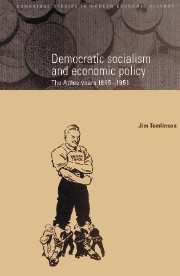Book contents
- Frontmatter
- Contents
- List of tables
- Acknowledgements
- List of abbreviations
- 1 Introduction: Labour and the economy 1900–1945
- 2 Labour and the international economy I: overall strategy
- 3 Labour and the international economy II: the balance of payments
- 4 Industrial modernisation
- 5 Nationalisation
- 6 Controls and planning
- 7 The financial system
- 8 Employment policy and the labour market
- 9 Labour and the woman worker
- 10 Towards a Keynesian policy?
- 11 The economics of the welfare state
- 12 Equality versus efficiency
- 13 Conclusions: political obstacles to economic reform
- Bibliography
- Index
3 - Labour and the international economy II: the balance of payments
Published online by Cambridge University Press: 09 November 2009
- Frontmatter
- Contents
- List of tables
- Acknowledgements
- List of abbreviations
- 1 Introduction: Labour and the economy 1900–1945
- 2 Labour and the international economy I: overall strategy
- 3 Labour and the international economy II: the balance of payments
- 4 Industrial modernisation
- 5 Nationalisation
- 6 Controls and planning
- 7 The financial system
- 8 Employment policy and the labour market
- 9 Labour and the woman worker
- 10 Towards a Keynesian policy?
- 11 The economics of the welfare state
- 12 Equality versus efficiency
- 13 Conclusions: political obstacles to economic reform
- Bibliography
- Index
Summary
Much of the economic history of the Attlee period could be written around the biennial balance of payments crises of the period. Few governments have devoted so much energy to this one policy area. But the balance of payments in this period cannot be treated as a simple economic constraint, imposing inescapable policy responses. On the one hand, the balance of payments problem was not simply a matter of exporting enough to pay for necessary imports, as contemporary economic propaganda often suggested. It also involved very substantial out flows for both overseas government expenditure and foreign investment. Equally, the responses to the payments problem were not preordained by the state of the economy, and the choice of those responses had a number of highly significant political as well as economic ramifications.
Given the broad context of international economic policy set out in chapter 2, the purposes of this chapter are threefold: to outline some of the complexities of the payments situation in the 1945–51 period; to discuss some of the military expenditure and foreign policy aspects of that situation, and how these were debated at this time; finally, the third section discusses one of the most politically problematic aspects of balance of payments policy in this period – its impact on the sterling area in general and the colonies in particular.
The scale of the problem
What was the balance of payments problem in this period? Clearly the legacy of the war was a huge current account deficit, with exports in 1945 at only 30 per cent of their pre-war level (imports 60 per cent), and shipping earnings substantially diminished.
- Type
- Chapter
- Information
- Democratic Socialism and Economic PolicyThe Attlee Years, 1945–1951, pp. 47 - 67Publisher: Cambridge University PressPrint publication year: 1996



